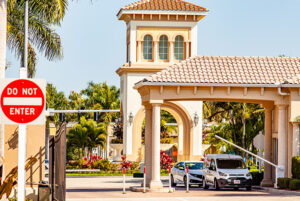Security is a top concern among many homeowners. But should boards allow the installation of a security door in HOA communities? The answer isn’t so clear-cut.
Security Door in HOA Communities: A Complex Issue
Living in an HOA community comes with many perks. Residents and their guests can use the common amenities of the association, which often include swimming pools, fitness centers, and clubhouses. Most associations also provide convenient services. But, despite popular belief, providing security is not usually one of them.
It is not part of an HOA’s primary duty to ensure the security of homes. As such, homeowners tend to take matters into their own hands by installing security doors or burglar bars on windows to protect themselves. These security doors and bars, though, don’t always comply with the architectural standards of the association. In such cases, the HOA might ask owners to take them down.
So can HOA prevent homeowners from installing security doors?
In a word, yes. If the restriction appears in the CC&Rs, then an HOA can prevent homeowners from installing a security door or burglar bars. Homeowners associations typically dislike such features because they conflict with the neighborhood’s aesthetics. Additionally, they can give the perception that the community is an unsafe place to live in. This can scare off potential buyers and drive down property value.
Though, there is a fine line that HOAs must walk here. While an HOA is not primarily responsible for security, if an HOA forbids a security door and a home is broken into, the HOA might find itself liable. This is especially applicable if the owner is able to demonstrate that the burglary happened because the HOA disallowed the installation of the security door.
 Balancing Security With Architectural Standards
Balancing Security With Architectural Standards
It can be difficult to enforce your architectural standards while allowing owners to perform their own security measures. If your CC&Rs prohibit the installation of a security screen door in an HOA, here are some steps you can take.
1. Evaluate the Why’s
If you find that an owner (or many owners) wants to install a security door, it is important to find out the reason behind their request. This will allow you to assess whether or not there is a real threat to security. Don’t be afraid to ask questions.
2. Take Everything Into Account
The next thing you should do is consider all the elements of the situation. An owner may want to install a security door because they have been robbed in the past. Your HOA board should also make sure that no similar violations manage to slip through the cracks. If a different homeowner has had a security door in place for years now, your board might be accused of selective enforcement.
3. Consider Alternative Measures
If security is a concern, you might consider implementing other measures instead of security doors. There are other options that are equally effective in preventing burglaries or trespassers. Perhaps install more lighting fixtures around the neighborhood or encourage owners to install an alarm. Today, many prefer security systems because of their advanced features.
4. Discuss With a Wider Audience
It’s also imperative that you get a conversation going. You never know, but this security issue might not be exclusive to a single owner. Perhaps other owners also bear the same sentiments. Take their input into account.
Your HOA board should also involve the Architectural Review Committee (ARC). The ARC may be able to suggest alternatives or recommend making an amendment. If it’s an aesthetic issue, perhaps the ARC can work with the board to come up with a list of pre-approved designs that won’t compromise the character of the community.
5. Amend, If Needed
If your HOA board deems it necessary, amend your governing documents to reflect your new standards. Depending on state laws and the CC&Rs, homeowners may also be able to petition the board to change the guidelines.
Other Tips to Enhance Security in HOAs
There are other ways your HOA can promote security in the neighborhood. It does not have to be confined to installing a security door in HOA communities. Here are some additional tips for enhancing security in your association.
1. Assess Security Risks
First, evaluate how vulnerable your association is to security threats. This will require the help of a professional to conduct a thorough security assessment. The process usually involves an on-site inspection to identify areas in the neighborhood with a higher risk of security issues. Professionals can also recommend solutions to effectively curb these issues.
2. Ensure Regular Maintenance of Security Systems
If your HOA already has a security system in place, it is important to maintain it regularly. This normally applies to gated or private communities that are not easily accessible to non-members.
Check your security gates to see if everything is working in order. Evaluate the performance of security guards (if you have them) and ensure that they’re doing their job well. If you need to update gate passes, do so. Many communities also have security cameras dotting the neighborhood. Make sure you perform proper maintenance on these cameras to ensure they’re functioning properly.
3. Partner With Local Authorities
If there is a threat of actual criminal activity, the HOA should not handle it alone. Your HOA board should partner with local law enforcement to mitigate these risks or address those that have already occurred. Maintaining a strong working relationship with local authorities will help you deter crime. You can do this by inviting a police liaison to attend your meetings and provide tips.
That said, it is important to distinguish actual risks from frivolous complaints. Law enforcement doesn’t have time to deal with trivial matters. And running to them every time you hear something go bump in the night will only sour your HOA’s relationship with them.
Not All Black and White
Broadly speaking, boards do have the ability to restrict a security door in HOA communities if it conflicts with architectural standards. But, boards should take a look beneath the surface and find out what’s driving owners to install such measures in the first place. Working with homeowners instead of blindly levying fines for violations is the best way to come up with a compromise.
Cedar Management Group provides expert HOA management services to communities. Call us today at (877) 252-3327 or contact us online to learn more about what we do!
RELATED ARTICLES:
- HOA Security Cameras: Maintaining Security And Privacy
- Data Security In HOAs: How Is Homeowner Information Protected?
- 5 Tips For HOA Fire Safety In Your Neighborhood






